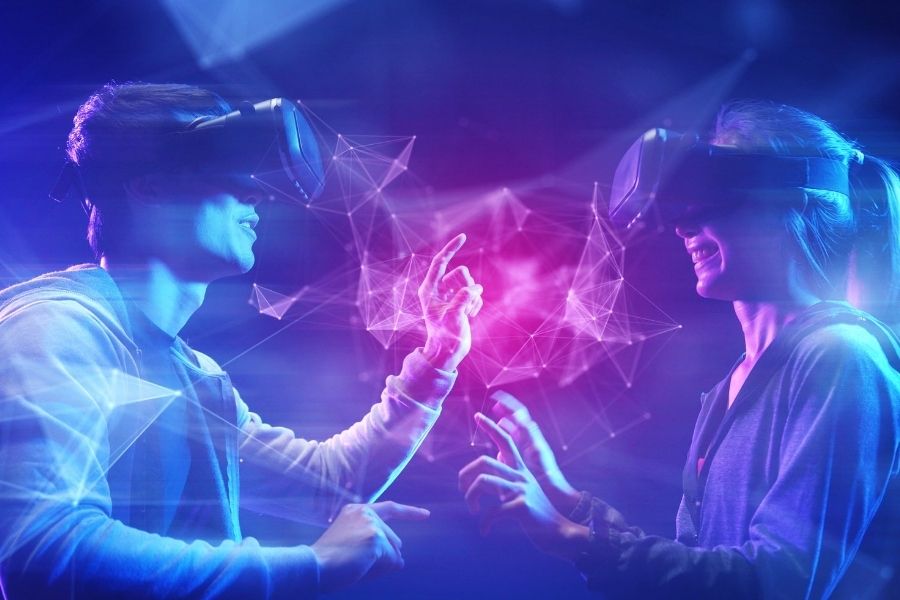
The Philosophy of the Metaverse: Examining the Nature of Reality in Virtual Worlds
- Antwan Koss
- April 19, 2023
- Metaverse
- augmented reality, metaverse, virtual reality, virtual worlds
- 0 Comments
In recent years, the concept of the metaverse has gained widespread attention, especially in the tech industry. A metaverse is a virtual world that exists within the internet, where people can create avatars and interact with each other in a digital environment. As this technology continues to develop, it raises important philosophical questions about the nature of reality and how we perceive it. In this article, we will explore the philosophy of the metaverse and examine its implications for our understanding of the world.
Introduction to the Metaverse
The metaverse is an immersive digital world where users can interact with each other and digital objects. It is often compared to the internet, but the key difference is that the metaverse is a 3D environment where users can create avatars that represent themselves. In this virtual world, users can engage in various activities, such as gaming, socializing, and even shopping. The concept of the metaverse has been around for several decades, but recent advancements in technology have made it a more realistic possibility.
The Nature of Reality in the Metaverse
One of the key philosophical questions raised by the metaverse is the nature of reality within this virtual world. In the metaverse, users are able to create their own reality, and they can interact with other users who are doing the same. This raises the question of whether the reality within the metaverse is just as real as the reality outside of it. Some argue that the metaverse is just a simulation, and therefore not real, while others argue that the experiences within the metaverse are just as real as those in the physical world.
The Self in the Metaverse
Another important philosophical question raised by the metaverse is the concept of the self within this digital world. In the metaverse, users create avatars that represent themselves, but these avatars are not necessarily a true representation of their physical selves. This raises the question of whether our sense of self is tied to our physical bodies, or whether it can be transferred to a digital representation. Additionally, it raises questions about the authenticity of our interactions within the metaverse, and whether they are a true reflection of our identities.
Ethics in the Metaverse
The development of the metaverse also raises important ethical questions. For example, who has control over the metaverse, and how is it regulated? Should users have the right to create whatever they want within the metaverse, or should there be restrictions on certain types of content? Additionally, the metaverse raises concerns about privacy and data security, as users are creating and sharing personal information within a digital environment.
The Potential of the Metaverse
Despite the philosophical and ethical questions raised by the metaverse, there is also a great deal of potential for this technology. The metaverse has the potential to create new opportunities for socialization, entertainment, and even commerce. It could also provide a space for people to explore new identities and experiences that may not be possible in the physical world.
The Connection Between the Physical World and the Metaverse
Another philosophical question that arises from the metaverse is the connection between the physical world and the digital world. While the metaverse is a digital environment, it is still created and maintained by physical technology and infrastructure. Additionally, the experiences within the metaverse can have a real-world impact on users, such as affecting their emotions or even physical health. This raises the question of whether the metaverse should be considered a separate reality from the physical world or if they are inherently connected.
The Role of Consciousness in the Metaverse
Consciousness is a complex concept that has puzzled philosophers for centuries, and the metaverse raises new questions about its role in our experiences. When we interact with the metaverse, are we truly conscious in the same way that we are in the physical world? Or is our consciousness somehow altered or limited by the digital environment? Exploring these questions could shed new light on our understanding of consciousness and its relationship to the physical world.
The Metaverse and Identity
In addition to the concept of the self within the metaverse, there are also questions about how the metaverse can affect our understanding of identity. For example, can we truly create a separate identity within the metaverse, or are we always tied to our physical bodies and identities? Additionally, as the metaverse becomes more immersive and realistic, it may be possible for users to create identities that are more convincing than their physical selves. This raises the question of how we define identity and authenticity within the metaverse.
The Metaverse and the Future of Society
As the metaverse becomes more developed, it is likely to have a significant impact on society as a whole. For example, it could create new opportunities for remote work and collaboration, or it could change the way we consume media and entertainment. However, it could also create new social and economic inequalities, or even contribute to the further fragmentation of society. Examining these potential impacts could help us anticipate and address potential challenges.
The Metaverse and the Limits of Technology
Finally, the metaverse raises important questions about the limits of technology and human innovation. While the metaverse has the potential to create new opportunities and experiences, it also raises questions about the cost and sustainability of these developments. Additionally, it raises questions about whether technology can truly replace or replicate certain aspects of human experiences, such as physical touch or emotional connection.
Conclusion
In conclusion, the development of the metaverse raises important philosophical questions about the nature of reality, consciousness, and identity. While there is no consensus on the answers to these questions, exploring them provides valuable insight into the potential impact of this technology on society as a whole. As we continue to develop the metaverse, it will be important to carefully consider these questions and ensure that the technology is being used in a responsible and ethical manner. Ultimately, the metaverse represents both a significant technological advancement and a profound philosophical challenge, and it will be up to us to navigate these complexities with care and intention.





